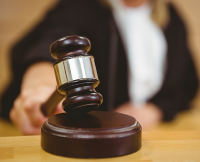New website will let law clerks judge their judges

Image from Shutterstock.
A database is launching next month that will allow young lawyers to review the judges they worked for and give law students a way to learn which judges have good—or bad—reputations as employers.
The site, open only to current and former clerks, is a crowdsourced effort started by a former law clerk who says her career was derailed by an abusive judge. It comes seven years after two famous appellate judges—one liberal and one conservative—were accused of sexually harassing female clerks, part of the wave of #MeToo revelations.
Aliza Shatzman, who founded the Legal Accountability Project in 2022, says she has already gathered over 800 surveys since she began soliciting them last April.
“You can be almost irreparably harmed” by a clerkship with the wrong judge, Shatzman said. She had planned to become a prosecutor in D.C. But her job offer was rescinded after a negative appraisal from a local judge who called her “bossy” and compared her unfavorably to his wife, a story she recounted to the House Judiciary Committee in 2022 as she advocated better protections for clerks. The following year, she launched her nonprofit with the aim of improving workplace conditions for judicial employees. While the Legal Accountability Project (LAP) has advocated for Congress to make it easier to sue federal judges for discrimination, it is also hoping to help would-be clerks avoid experiences that lead to lawsuits.
Some individual law schools have similar databases, Shatzman said, and there is an informal “whisper network” of former clerks who warn acquaintances about particular judges. But she says that leaves out many applicants, particularly those who don’t come from prominent schools or have connections to lawyers who have held prestigious clerkships. And she said law school officials, wanting to tout how many students go on to clerkships, are reluctant to steer them away from any judge.
“Law schools and the judiciary are both at fault here,” Shatzman said. “They have had centuries to self-police and have not done so.” She initially planned for the project to run through law schools with the institutions gaining access for $5 a student. But some schools have resisted, including her alma mater, which raised concerns over accuracy. She decided to open it up directly to all young lawyers and law students for $20 each.
Shatzman said she uses identification cards and other methods of proof to verify the identity of every student who wants access to the database and every former clerk contributing to it, although the reports themselves are by default anonymous. The database solicits feedback on a judge’s interviewing process, hours, assignment style and workplace environment. Judges are also given a “positive, neutral, or negative” rating. Would-be clerks can search by name, court and location as well as gender and race. They can add their own demographic information if they choose.
That setup is likely to protect Shatzman and her group from defamation lawsuits should any negative reviews get back to a judge. Under a law known as Section 230, operators of online forums like Yelp or Glassdoor can’t be held responsible for the content posted on their sites.
“That’s pretty core Section 230 and I say this as someone who has generally advocated for narrower Section 230 interpretations,” said Alan Z. Rozenshtein, a professor at the University of Minnesota Law School. But, he said, “they will have to be very careful with how exactly how they do this.” In 2022, a judge ruled that the creator of a list collecting anonymous accounts of sexual misconduct by men in the media was not protected from suit because her emails about it might have “encouraged” defamatory contributions. She settled with a man on the list for an undisclosed sum.
“There could be two sides to any of these stories,” said Judge Douglas Nazarian, a state appellate judge in Maryland who sits on LAP’s board. “The purpose is to democratize and improve the clerkship experience, not to find ways to get judges in trouble.” Knowing he can never read them, he has encouraged all of his former clerks to fill out surveys, he said. “I’ve put my own money where my mouth is.”
Nazarian said his own clerkship “was an unbelievably good thing” that helped put him on the path to his current position. He attends regular reunions with other clerks; over three decades on, he and Judge James B. Loken are still in touch. “These are professional relationships and networks that can be really foundational,” he said. He hopes the database will help direct clerks toward judges who are “not famous” but have “terrific reviews,” and make law students from less-privileged backgrounds more comfortable with the process.
“I tend to look at it more as a broadening opportunity than as a place to tell bad stories,” he said. “But it can be both.”
Rozenshtein, who clerked for a judge on the U.S. Court of Appeals for the 4th Circuit and leads the clerkship committee at his school, said he has “complex feelings” about the database. “The vast, vast, vast majority of judges are totally normal human beings,” he said. “There are bad judges out there; there are also bad law students.”
He said the “underlying problem” is that law students often feel they must do clerkships if they have the chance, even with judges known for offensive conduct. “I really applaud the spirit behind it,” he said. “I just don’t know whether this is going to be the thing that moves the needle.”
LAP also supports legislation that would make the federal judiciary subject to laws barring discrimination in the workplace and protecting whistleblowers. Judiciary officials have resisted that proposal, saying it would reduce judges’ independence. Despite bipartisan support, the bill has not moved forward in Congress.
“We are the positive movement” in the judiciary since the #MeToo revelations, Shatzman said. “Sadly, there has not been much else.”



